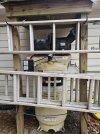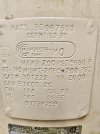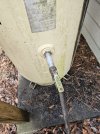This has been a nasty cold winter in Georgia
Worst I can remember, so something I learned that might help you.
This compressor, from day one, has had only moble1, and the viscosity was what I had extra in the garage as ordinary stock is 15w50,
5w30, 5w40/0w40 euro grade.
Well, this cold, I have replaced three belts in a short time due to hard starts.
To solve the issue, I went to 0w40 and could tell the following day at 28 degrees, it did not labor.
Im not trying to promote synthetic oil, but just hoping my experience with viscosity will help you if needed.
Worst I can remember, so something I learned that might help you.
This compressor, from day one, has had only moble1, and the viscosity was what I had extra in the garage as ordinary stock is 15w50,
5w30, 5w40/0w40 euro grade.
Well, this cold, I have replaced three belts in a short time due to hard starts.
To solve the issue, I went to 0w40 and could tell the following day at 28 degrees, it did not labor.
Im not trying to promote synthetic oil, but just hoping my experience with viscosity will help you if needed.



